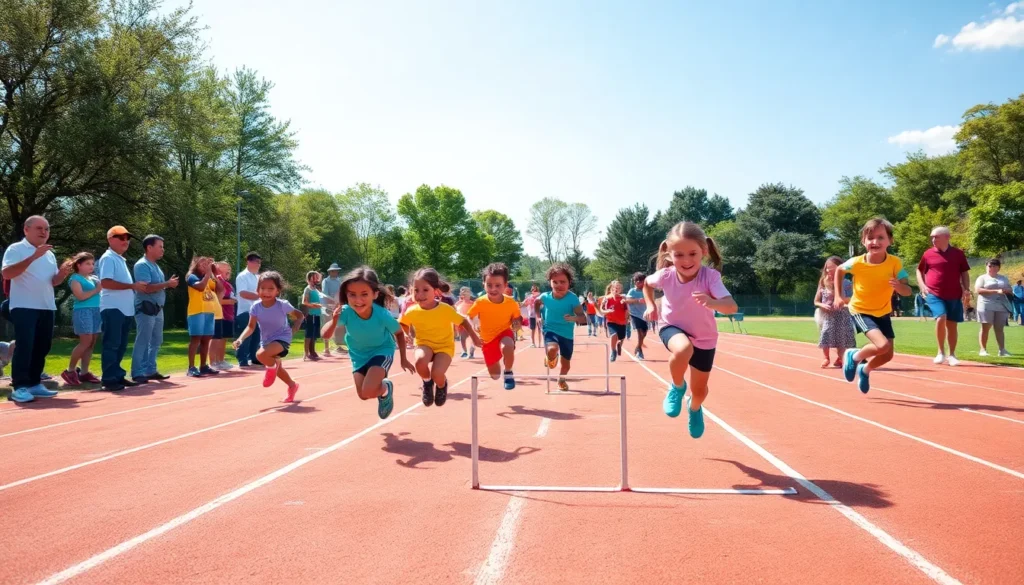When it comes to getting kids active, athletics events might just be the secret sauce to a healthier, happier child. Conducting sprints, hurling javelins, and leaping into the long jump pit are not just for Olympians: they can ignite a spark of passion in kids. Picture your little one racing away with their friends, a mile-wide smile plastered on their face. That’s what athletics do, they help kids develop physically, socially, and emotionally while giving parents a front-row seat to all the action. So, let’s jump into why athletics events are not just beneficial but downright essential for the pint-sized athletes in our lives.
Table of Contents
ToggleImportance Of Athletics In Child Development

Physical Benefits
Athletics events are fantastic for kids’ physical development. Engaging in running, jumping, and throwing not only helps strengthen muscles but also boosts cardiovascular health. Regular participation lays the groundwork for a lifetime of fitness. Children who are active in athletics often enjoy an increase in stamina and endurance, giving them the energy to tackle everything from schoolwork to weekend adventures. Plus, who can resist a little friendly competition? The thrill of racing and aiming for personal bests can motivate kids to push their physical limits.
Mental Benefits
Beyond physical prowess, athletics offers significant mental advantages. Concentration and focus get a workout, too. During events, kids learn to strategize, whether it’s planning their next move in a race or working on techniques for a particular field event. The resilience developed by learning to cope with wins and losses also fosters a positive mindset. Kids come away with improved self-esteem and confidence as they beat their personal records or simply give their best effort, showing that achieving goals isn’t always about winning, but about personal growth.
Social Skills Development
Athletics events provide an excellent platform for kids to cultivate essential social skills. Through collaboration and competition, they learn valuable lessons in teamwork and sportsmanship. They cheer each other on during relays, high-fives exchanged after a race, and lessons on handling disappointment when things don’t go as planned. These experiences help kids forge friendships and develop a sense of community that extends beyond the athletic field. As children interact with teammates and opponents alike, they refine their communication skills and gain a deeper understanding of empathy and respect.
Popular Athletics Events For Kids
Track Events
When it comes to track events, the excitement is palpable. Kids can participate in sprints, middle-distance races, and even hurdles. Each event requires different skill sets, so there’s something for every budding athlete to explore. This variety can keep participation lively and engaging, encouraging kids to find their passion.
Field Events
Field events like long jump, high jump, and shot put offer thrilling challenges. Who wouldn’t want to leap into the air or give a heavy projectile a good toss? These activities sharpen coordination and motor skills, giving children a chance to shine in a different arena than running alone.
Relays and Team Events
Relays truly emphasize teamwork, where kids pass the baton in a thrilling race of speed and strategy. These team events inspire cooperation and build strong bonds among participants. Relays instill an understanding that success is often a collective effort, teaching that everyone plays a vital role.
How To Encourage Participation
Creating a Supportive Environment
Parents and coaches play pivotal roles in encouraging children’s participation in athletics. Building a supportive environment can foster enthusiasm and dedication. Celebrate small victories at home, attend events, and engage with coaches to show kids that their efforts are valued. This encouragement can transform their athletic endeavors into cherished memories.
Setting Realistic Goals
Help kids set realistic and achievable goals. This might include targeting personal bests or participating in a specific number of events per season. When kids see their progress toward these goals, they gain motivation and confidence. Remember, it’s about the journey, not just the destination: guide them through the process of improving their skills and enjoying the experience.








